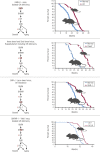Growth Hormone Deficiency: Health and Longevity
- PMID: 30576428
- PMCID: PMC6416709
- DOI: 10.1210/er.2018-00216
Growth Hormone Deficiency: Health and Longevity
Abstract
The important role of GH in the control of mammalian longevity was first deduced from extended longevity of mice with genetic GH deficiency (GHD) or GH resistance. Mice with isolated GHD (IGHD) due to GHRH or GHRH receptor mutations, combined deficiency of GH, prolactin, and TSH, or global deletion of GH receptors live longer than do their normal siblings. They also exhibit multiple features of delayed and/or slower aging, accompanied by extension of healthspan. The unexpected, remarkable longevity benefit of severe endocrine defects in these animals presumably represents evolutionarily conserved trade-offs among aging, growth, maturation, fecundity, and the underlying anabolic processes. Importantly, the negative association of GH signaling with longevity extends to other mammalian species, apparently including humans. Data obtained in humans with IGHD type 1B, owing to a mutation of the GHRH receptor gene, in the Itabaianinha County, Brazil, provide a unique opportunity to study the impact of severe reduction in GH signaling on age-related characteristics, health, and functionality. Individuals with IGHD are characterized by proportional short stature, doll facies, high-pitched voices, and central obesity. They have delayed puberty but are fertile and generally healthy. Moreover, these IGHD individuals are partially protected from cancer and some of the common effects of aging and can attain extreme longevity, 103 years of age in one case. We think that low, but detectable, residual GH secretion combined with life-long reduction of circulating IGF-1 and with some tissue levels of IGF-1 and/or IGF-2 preserved may account for the normal longevity and apparent extension of healthspan in these individuals.
Copyright © 2019 Endocrine Society.
Figures



References
-
- Brown-Borg HM, Borg KE, Meliska CJ, Bartke A. Dwarf mice and the ageing process. Nature. 1996;384(6604):33. - PubMed
-
- Coschigano KT, Holland AN, Riders ME, List EO, Flyvbjerg A, Kopchick JJ. Deletion, but not antagonism, of the mouse growth hormone receptor results in severely decreased body weights, insulin, and insulin-like growth factor I levels and increased life span. Endocrinology. 2003;144(9):3799–3810. - PubMed
Publication types
MeSH terms
Substances
Grants and funding
LinkOut - more resources
Full Text Sources
Medical
Miscellaneous

